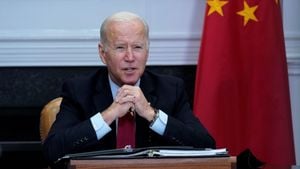WELLINGTON, New Zealand — A proposed law intended to redefine New Zealand’s founding treaty between the British Crown and Māori chiefs has sparked one of the largest protests ever seen in the country, with around 42,000 people marching to the Parliament. The demonstration highlighted rising tensions surrounding race relations and the historical grievances of New Zealand's Indigenous people.
Protesters gathered outside Parliament on Tuesday, chanting slogans and waving banners to express their opposition to the bill, introduced by David Seymour, the leader of the libertarian ACT Party. The proposed legislation aims to reinterpret the Treaty of Waitangi, originally signed in 1840, and applies its principles to all New Zealanders, not just the Māori. Critics argue the bill would dilute Māori rights and is reminiscent of past injustices inflicted upon the Indigenous population.
The Treaty of Waitangi, often seen as New Zealand's founding document, was signed by representatives of the British Crown and roughly 500 Māori chiefs. It set forth principles believed to govern the future relationship between Māori and the Crown, though variations between the English and Māori versions have led to confusion and disputes over its interpretation. Seymour's bill highlights discontent among certain groups, particularly those who believe the current structure favors Māori at the expense of non-Indigenous citizens.
While the bill has cleared its first reading with the support of the ACT Party and initially allied parties, its future is uncertain. Many parliamentarians have since expressed hesitance to endorse the legislation, contributing to speculation about its viability. Legal experts caution the bill could set back decades of progress made through treaties and negotiations aimed at correcting historical injustices.
Over 203,650 people signed petitions opposing the bill, which were presented at Parliament. Schools even excused students to join the march, underscoring the broad societal support for Māori rights. Participants, including Wellington’s mayor, were visible among the crowd, signaling widespread recognition of the treaty’s relevance and the need to honor its commitments.
Protesters engaged in traditional Māori customs, such as the haka, and displayed flags representing Māori sovereignty. Emotions ran high, especially when Seymour made an appearance; his presence led to chants of “Kill the bill” and significant booing from the crowd. Many public comments noted the importance of passing down Māori identities and rights to future generations.
Protesters not only voiced opposition to Seymour's bill but also denounced other government policies perceived as discriminatory or undermining to Māori affairs. This broad spectrum of discontent reflects the deep-rooted frustrations within Indigenous communities concerning their treatment and recognition within New Zealand’s broader legal framework.
The bill has sparked debate not only for its content but for its underlying insinuations about New Zealand’s approaches to race relations. Supporters of the legislation claim it promotes equality among citizens; detractors argue it poses a grave threat to Māori identity and their fight for rightful recognition and reparations stemming from colonization.
The significance of this protest lies not just within New Zealand but as part of the global conversation around Indigenous rights and the historical contexts of colonialism. Advocates for Māori sovereignty have utilized peaceful marches, known as hīkoi, to shed light on injustices and rally support for their cause for decades.
The situation remains fluid, with public sentiment against the bill appearing to strengthen. The government faces mounting pressure to reconsider its approach toward Māori rights and to seek collaborative solutions rather than imposing legislation perceived as regressive.
Ben Ogilvie, one of the non-Māori protesters, emphasized the importance of the Treaty, stating, "The Treaty is a document relevant to all of us here in Aotearoa. Holding it up and respecting it is really important. I hate what this government is doing to tear it down." His comments resonate with many who feel the proposed law threatens not just Indigenous rights but the fabric of New Zealand society as it has evolved over the last century.
This rally, and the broader movement it reflects, signals to lawmakers and the public alike the passionate commitment many New Zealanders feel toward recognizing and rectifying past wrongs—a reminder of the enduring struggle for justice and equality.
The legislative process will continue as public feedback is solicited, and the memory of this protest will remain as part of the living history of Māori rights advocacy and New Zealand’s commitment to addressing its colonial past.



